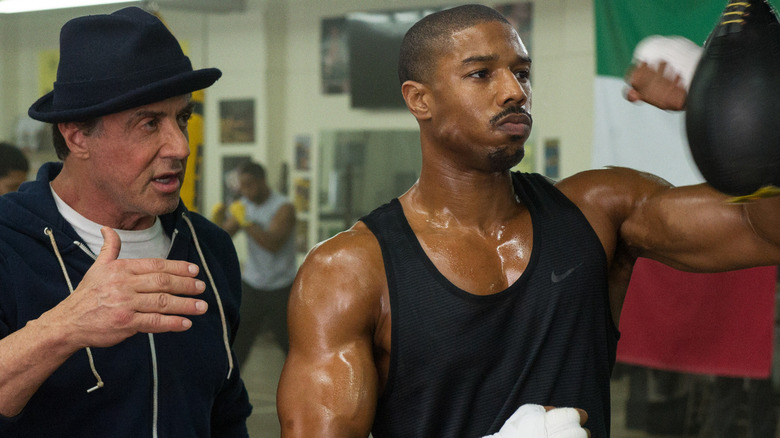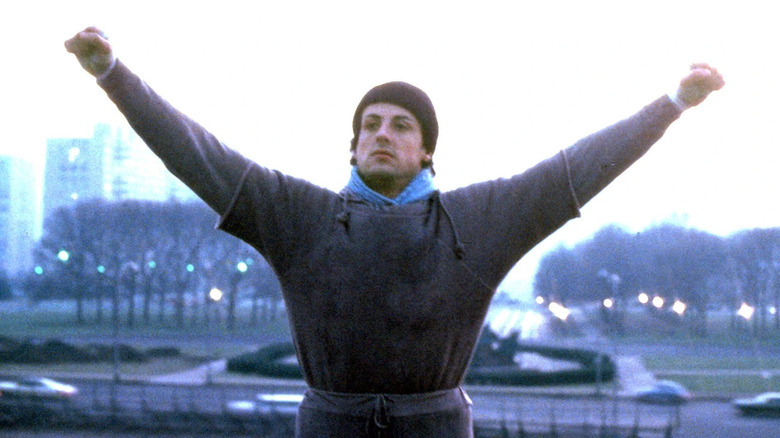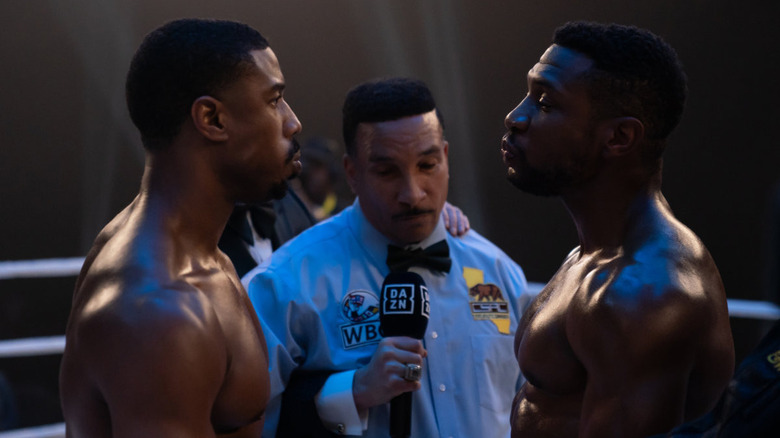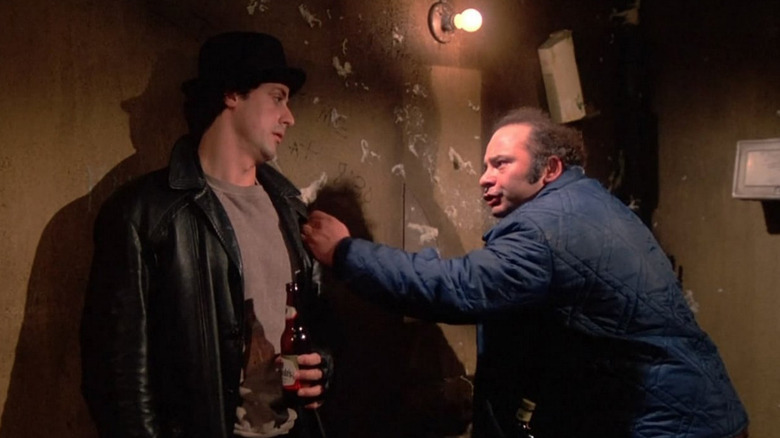The Rocky Franchise Has Grown Beyond Sylvester Stallone
Sylvester Stallone sure has had one hell of a run with his most famous onscreen creation, Rocky Balboa. He's had a long career full of ups ("First Blood," "Cop Land") and downs ("Stop! Or My Mom Will Shoot"), but when people look back at Stallone's contribution to cinema in 50 or 100 years' time, it will be the big-hearted slugger from Philadelphia who Sly is best remembered for.
Perhaps because of his association with the action genre and easily-spoofed screen persona, people don't always give Stallone the credit as an artist he deserves. After all, you can say what you want about the overall quality of the "Rocky" franchise, but there can be little doubt that he created one of the greatest movie characters of the 20th century. Plenty of actors are intrinsically linked with their most famous roles; just take Harrison Ford, who pulled off the feat of embodying not just one but two iconic characters, Han Solo and Indiana Jones. But Ford didn't create those characters the way Stallone did with Rocky.
It's easy to see why the Italian Stallion found his way into so many people's hearts. We all love an underdog, and Rocky's rise from down-on-his-luck club boxer to heavyweight champion of the world is truly aspirational, reassuring us that with enough guts and determination, we can achieve anything. It is the American Dream in action, yet the message resonates whether you're from Kensington, Philadelphia, or Kuala Lumpur, Malaysia. That's why the "Rocky Steps" have become one of the city's biggest tourist attractions; people from all over the world come to run up them just like Rocky and jump around at the top.
But now, almost 50 years after "Rocky" was released, the seemingly unthinkable has happened: "Creed III" is the first movie in the franchise without Stallone playing a direct part.
Sylvester Stallone's long run as Rocky Balboa
In the early '70s, Sylvester Stallone was an actor struggling to make an impact in Hollywood. Then one night, everything changed. Stallone saw journeyman battler Chuck Wepner's fight against Muhammad Ali and take the champ to within 19 seconds of going the full distance.
Wepner's heroics inspired Stallone. He knocked out a screenplay in three days and stuck to his guns, refusing to sell it unless he could also play the lead role. The rest is history. "Rocky" was a smash hit and received nine Oscar nominations, including Best Actor and Best Original Screenplay for Stallone, and won Best Picture and Best Director for John G. Avildsen.
After the roaring success of "Rocky," it was pretty much Stallone's franchise to do with what he wanted. He wrote five sequels and directed four of them, the sequence broken only by Avildsen returning to helm the dreary "Rocky V."
The trajectory of the "Rocky" franchise is pretty wild. After "Rocky II" made Balboa heavyweight champion, the series grew increasingly cartoonish in the '80s, much lampooned for its over-reliance on training montages. The dismal "Rocky V" still made good box office but felt like the antithesis of the previous installments, seemingly spelling the end of the franchise.
Then in 2006, after a run of poor movies, Stallone brought his beloved character back again in "Rocky Balboa," a return to the character-based drama of the original after the more bombastic entries.
Stallone and Rocky still weren't quite done. "Creed" came along in 2013 and Stallone reprised the role as an aging Balboa training Apollo Creed's son Adonis (Michael B. Jordan). In a nice touch of symmetry, Stallone received an Oscar nomination for his performance. He returned once again in "Creed II," before dropping out of the series altogether before "Creed III."
The upcoming Creed-verse?
In February this year, Michael B. Jordan confirmed that there will be a "Creed IV" and also talked about other spin-offs in the "Creed-verse." That's right, everyone — although Sylvester Stallone may no longer be a creative force in the "Rocky" franchise, the series is likely to become a Cinematic Universe. Personally, I'd love to see a de-aged Burt Young in "Paulie," 90 minutes of Rocky's best friend getting angrily drunk and yelling at the TV set above the liquor rack of his local bar.
Although Cinematic Universes are often the domain of huge superhero and science fiction franchises, it is a sign that the "Rocky" series has reached a level of cultural saturation where it can thrive without the involvement of its creator. There are plenty of precedents in this respect. Perhaps the biggest began the year after "Rocky" hit the screens with a little movie called "Star Wars," unfancied at the time of release but a box office monster that would change the face of cinema forever.
It was George Lucas's baby, of course, and he retained creative control over the colorful galaxy all the way up until 2012 when he sold Lucasfilm to Disney for $4.1 million, citing family reasons as his motive for stepping away. Now if you go to Disney World in Florida you can see the incongruous spectacle of Imperial Storm Troopers marching along with Cinderella's Castle in the background. Since the sale, the "Star Wars" Universe has grown exponentially. There has been a concluding trilogy to the Skywalker saga, spin-off films, and several animated and live-action TV series. The quality isn't always good, but it seems the appetite for hanging out in the galaxy Lucas set into motion over 45 years ago continues unabated.
Why do Cinematic Universes thrive without their creators?
Let me get this out of the way: I was a huge "Star Wars" fan as a kid but now I'm pretty weary of the endless content. For me, it drains much of the escapist magic of the original films. What I will say about the "Star Wars" Universe's expansion is that it has enabled writers and producers to explore aspects of Lucas's galaxy that might have never seen the light of day otherwise. His vision is so well-established in the public consciousness that it can not only survive, but flourish. "The Rise of Skywalker" proved how tired that saga was by the time it staggered over the line, but shows like "The Mandalorian" and "Andor" have gone on to prove that there are almost limitless possibilities for the tales you can tell within that Universe.
It helps that "Star Wars" now comes with such a baked-in audience that new creators have the freedom to try new things without much fear of failure. Even if a movie or a series s**ts the bed, the continued hunger for more "Star Wars" material means it isn't likely to break the Universe. Nostalgia also plays its part. I've already shown my kids the original "Star Wars" trilogy and they loved it. I'm sure many other parents are the same way, exposing their children to the stuff they adore from the earliest age possible, which means our kids will grow up with nostalgia for them, too. The cycle will continue.
The same goes for "Rocky" and the "Creed-verse," as Michael B. Jordan has called it. Now departed from the creative control of Sylvester Stallone, it is free to move in directions that its originator may not have considered taking it in. So who knows? I might get my "Paulie" movie one day.



